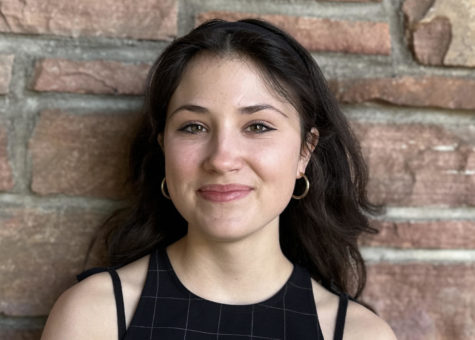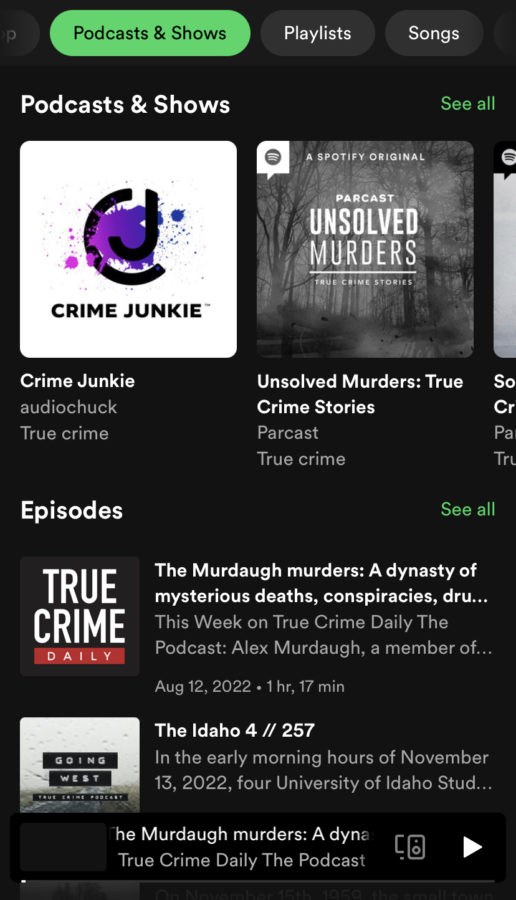A Crime Junkie’s World
Spotify has a variety of top true crime podcasts for your listening enjoyment.
I’m obsessed with true crime. Chances are you are too, and even if you’re not publicly open about it, many of you would put down true crime as one of your guilty pleasures if asked.
You’re not just a nerd if you like true crime, I promise. According to BBC Science Focus, “it’s in our nature to be highly attuned to criminal misdemeanors, and we instinctively want to discover the ‘who’, ‘what’, ‘when’ and ‘where’ so we can find out what makes criminals tick, and to better protect ourselves and our kin.” There’s also “a problem-solving element to many of the cases…and there’s the satisfaction of getting lost in a really good story.”
In order to feed this hunger for mystery, true crime podcasts, shows, docu-series, documentaries, and even books, have emerged as one of our most consumed genres. A 2022 YouGov poll found that “half of Americans say they enjoy the genre of true crime, including 13% who say it’s their favorite genre.”
Even if you have the most basic true crime knowledge, chances are you’ve heard about the podcast Serial. Serial is a podcast from the creators of This American Life and is hosted by Sarah Koenig. Telling one story over the course of a season, “Serial has won every major award for broadcasting.” If you’re new to true crime, this is where you should start.
Also notable is Morbid: “[a] true crime, creepy history and all things spooky podcast hosted by an autopsy technician and a hairstylist.” Not only does Morbid have weekly episodes covering a variety of different crime stories—solved and unsolved alike—but it also has weekly “Listener Tales” episodes, which include stories from listeners detailing their real-life experiences with the true crime AND supernatural. With coined phrases such as “puhduhfuh” (pdf) and “keep it weird”, Morbid is engaging and makes you feel a part of a greater community. If you’re looking for a mix of supernatural and true crime, and stories that do due justice to victims, this podcast is definitely for you.
Other podcasts that are worth your time are Park Predators (murders in national parks), Criminal, and My Favorite Murder.
If you’re interested in fictional TV series’, following your basic true crime/mystery plots would be Criminal Minds and How to Get Away with Murder. Criminal Minds, besides having an apparently underrated attractive male lead (Spencer Reid), follows an investigative/police force as they encounter and solve crimes one by one, tackling inevitable life drama as it comes. How to Get Away with Murder follows a group of college students as they navigate the complexities of their criminology and law education and accidentally end up murdering someone—classic. You can also check out Mindhunter, and for more romance-focused and fantastical, Lucifer.
In terms of documentaries and docu-series’, “Murdaugh Murders: A Southern Scandal”, “Capturing the Killer Nurse”, and “Ted Bundy: Falling for a Killer” are some of the most riveting. There are a million documentaries out there, and you pretty much can’t go wrong. If you’re looking for podcasts in visual form and told through more personal accounts, this is definitely where you should go.
If true-crime books are your preferred medium, see Bad Blood, any John Grisham, Tana French or Agatha Christie book, Crime and Punishment or The Secret History.
Despite its popularity, not all true crime media is effective and ethical. Most of us have heard of the new “Dahmer” fictional series by now. TIME states, “Monster: The Jeffrey Dahmer Story is the second re-telling of the life and crimes of the serial killer Jeffrey Dahmer that’s come out in the last five years alone, and the third take on his story in the past two decades.”
Although very popular, “[c]ritics have questioned the need to revisit the story of a serial killer who targeted young men who were primarily Black and brown…Some family members of the victims of Dahmer have also spoken out against the series, saying it has retraumatized them. The series also came under fire after Netflix tagged it as “LGBTQ” content (as drama over this choice arose on TikTok, Netflix quickly removed the label).”
Furthermore, according to the Indianapolis Business Journal, the once beloved podcast Crime Junkie – with host Ashley Flowers and co-host Brit Prawat – has not always been received well by newspaper reporters. “In 2019, ‘Crime Junkie’ was accused of plagiarism by Cathy Frye, a former Arkansas Democrat-Gazette reporter.”
Situations such as these remind us of the delicacy and gravity of the circumstances/situations these true crime mediums document and the infallibility of these storytelling methods.
The genre of true crime can bring awareness to the violence committed against victims and can expose the flaws of America’s criminal justice system. Rabia Chaudry, an attorney and host of the true-crime podcast “Undisclosed”, offers, “‘I think true crime has been a net positive for future defendants or existing defendants because the system is getting a lot of pressure because of what is being exposed.’”
However, the prevalence and gore of the genre bring up an important question: at what point do we watch too much true crime? Does true crime romanticize violence and murder and desensitize the audience to these horrific acts? The Michigan Daily explains, “Constant consumption of true crime can lead to heightened anxiety and can contribute to a dangerous kind of desensitization that leaves us unbothered in the face of violent crimes—the very situation that led to individuals parading around in Jeffrey Dahmer costumes on Halloween. We become so used to the violence that we forget its seriousness.” Writer and stabbing survivor Emma Berquist “fears that true crime’s entertainment value obscures the harm it can do to real people by inspiring vigilantism.”
The Michigan Daily continues, “Behind every gruesome murder case, there is a real person who had hopes, dreams and a family who is very likely still living with the trauma of losing a loved one. In situations like these, producers and writers bear the responsibility of representing such gruesome events in a way that humanizes and honors the victims…It has been shown time and time again that highlighting perpetrators of violent crimes, whether in the news or through some other medium, can inspire copycat incidents.”
The New York Times explains, “Like all genres of storytelling, there is good and bad true crime.” It’s important to research the medium and topic and check in with yourself to make sure that you don’t cross the line when it comes to protecting and respecting the victims, their families, the situation and yourself.

Hannah Berns is the Opinion Editor for the OWL Newspaper and a junior at Boulder High School. She joined the OWL during the second semester of her junior year and has enjoyed writing articles ranging from “Why Ghosts Are Real” to the issues with the school’s National Honor Society. Apart from the OWL, Hannah enjoys listening to true crime podcasts and watching true crime documentaries, singing with the BHS High Altitude Choir, and anything skiing, biking, camping, or hiking related. Hannah is also the founder of the Creative Writing Club at Boulder High, a dedicated member of the Mountain Bike Team, an intern for Boulder-based Creativity Alive, and a volunteer at the Humane Society of Boulder...


